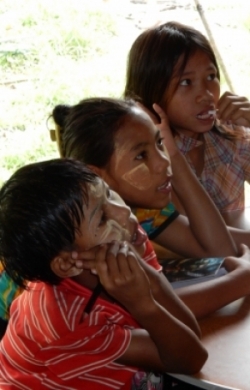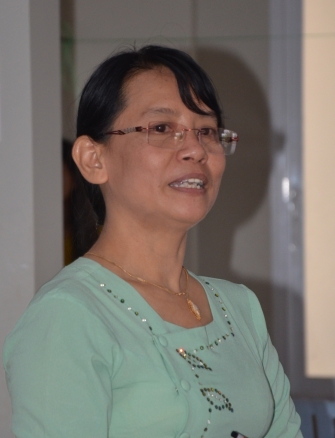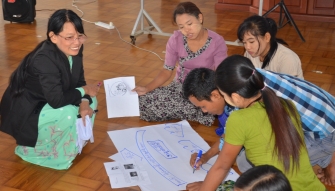
Galleries:
Annual reports:
You can see how our work has developed by reading some of our current and recent annual reports:
S4SK & H4SS Report and Appeal 2022
S4SK & H4SS Report and Appeal 2021
S4SK & H4SS Report and Appeal 2020
S4SK & H4SS Report and Appeal 2019
S4SK & H4SS Report and Appeal 2018
S4SK & H4SS Report and Appeal 2017
S4SK & H4SS Annual Report 2016
S4SK & S4SK-M Annual Report 2015
S4SK & S4SK-M Annual Report 2014


Daw Aye Aye Thinn (Programme Director for PALM) on the PALM strategy for reaching out of school children
Every child has the right to survival, development, protection and care, and active participation within the community. There is less opportunity for an out-of school child to develop his/her personality, capacity, to have access to education, and to be recognized as a child.
In our country, over 87% of the children are enrolled in primary level and, of those, over 10% drop out. However, the number of out-of-school children, of primary school age, who have never been to school, is not known. Most of them have to work to support family income, so simply cannot attend formal school.
Therefore, at S4SK, we feel that Non-Formal Education (NFE) classes for literacy, numeracy and life-skills are important, not only because they provide these children with the opportunity to learn for their individual development, but also to avoid the negative effects of ignorance on our society. Drawing and Music are parts of the NFE curriculum since they develop the sense of aesthetic value. In order to raise children’s sense of self-confidence, handicraft lessons are also included. Our intention is that handicraft skills will be a bridge to serious vocational training later.
Moreover, we expect the children who have completed the whole course to achieve the basic learning competencies equivalent to the primary level.
Our target groups include the children of scavenging and begging families, orphans, and young people from poor homes who do not have the resources to progress their education. They are selected by the NFE teachers in cooperation with community leaders, and we check that they are within our target group in being out of school because they have to work to support the family income.
We try to keep class sizes small, usually with around ten students in a class, so that our teachers are to be able to give individual attention to each child. The teachers teach 3 hours a day and 5 days a week. Class times are decided depending upon the local situation.
Both formative and summative systems of assessment are used. Formative assessment (by which pupils are assessed in order better to guide them) is ongoing throughout the year as part of the teaching-learning process, and summative assessment (by which pupils’ achievement is measured) takes place at the end of a course.
The NFE class teachers are selected by their ability and commitment to the cause of helping very disadvantaged children. Our teacher-training course includes the nature of teaching and learning, strategies to motivate pupils to learn, active learning, the whole child development, and classroom management. For their capacity development, the Education Development Officer mentors class teachers once a month throughout the whole academic year. Each class is monitored and evaluated every month.
The teachers not only teach the children, but also observe the situation of their families and respond to health needs if necessary. There is a parent-teacher meeting once a month. In this way, we can improve the parents’ awareness of the value of education and discuss, their children’s progress month by month. We hope the lives of these poor kids can be raised by means of our NFE program, and that the attitudes of parents can be positively changed as well.





